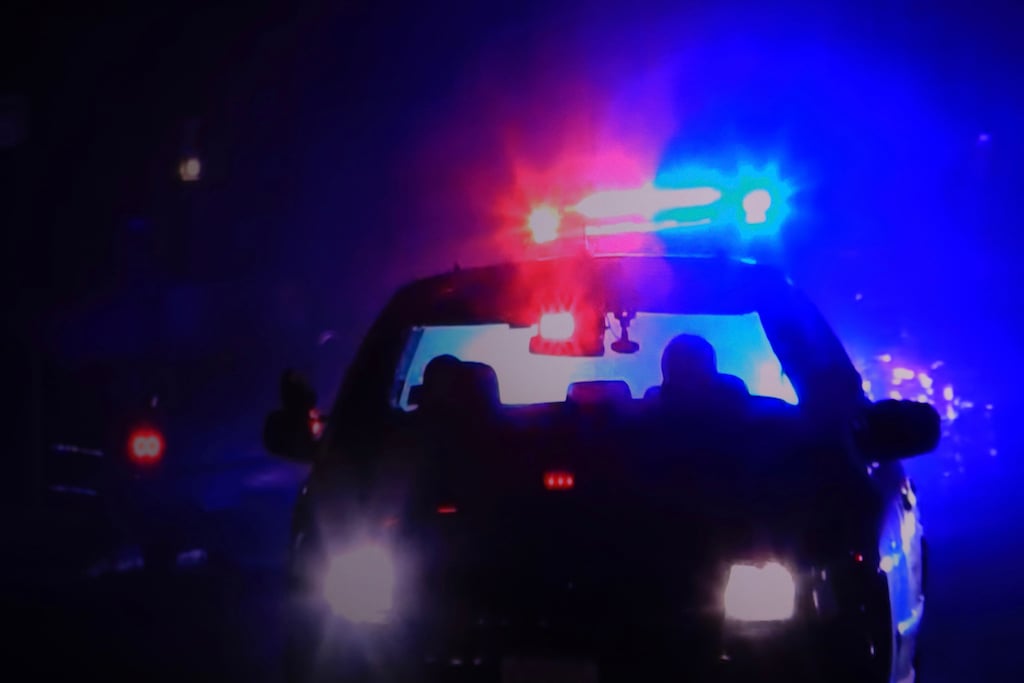It’s the last day of my first semester of college. The temperature has dipped, and the night is icy. The river—the Potomac—gushes wide and bitterly cold, flanking the capital city. It pulses towards the Atlantic; dragging along that West Virginia mountain water so fast it can’t catch its breath long enough to freeze.
Campus is repose, frostbitten. Everyone in Thurston dorm has bolted home except for Sara—a girl I know from class—and me. We both fly out in the morning and find ourselves together in the blazing-hot dorm, stir-crazy and bored. There’s a movie playing that neither one of us has seen, so we’re off.
The quickest way to the movie theater is to walk down Virginia Avenue and cross over the little bridge that connects us to Georgetown. We walk and chat about the frozen wind blasting our faces. I’m excited to escape my first eastern cold snap and return to the warmth of southern California. Sara is headed back to Florida. We are, neither of us, children built for frozen nights.
We stride in the brisk air and discuss our classes and the final we’ve both just taken for Introduction to International Affairs, and Sara makes fun of me for being the kid in class whose hand is always up. Looking to the left as we pass the monstrous Watergate Building—so ugly and comatose—we try to remember details about it but come up with only the obvious one. This is before the summer I will spend as a tour guide, before I learn that this part of the Capital used to be the gateway to the city. It was here, long ago, that people arrived by ship. The water’s gate. Sara and I talk of the water, of the beaches where we hope to spend time over vacation, of warmth and family.
Thompson Boat Center occupies that little strip of land east of what’s now the Georgetown Waterfront, between the main seam of the Potomac and the tiny spits of Rock Creek and the C&O Canal that feed it. As we cross over the strip of the tributary from the Watergate side to the Thompson’s side, I glance down at the cascade of whitewash. The water level is high, and it seems to be rushing at the pace of a rapid. Or perhaps that is only how it seems to me now—after everything that happened.
Below in the darkness, the water appears more vapid gray than midnight blue.
We are nearly across the bridge when I hear the splash. I flinch and look at Sara, whose face shows no alarm. She’s talking and I’m listening, but I stop, and she pauses her chatter.
“Did you hear that?” I ask.
“Hear what?”
“The splash. You didn’t hear the splash?”
“I didn’t hear anything.”
We listen, and it’s so very faint. “Help,” and then a second later, once more, “Help.”
“Did you hear that?” I ask again. It sounds like a person groaning—like a ghost with a raspy sore throat: faint, eerie, distant. “I think someone fell in.”
“It’s nothing. Let’s just keep going,” Sara presses.
They say you’re less decisive when you’re with someone else. The burden, the sense of responsibility to act, is shared and therefore weakened. We feel less brave—less responsible. I know now that they call it the bystander effect.
My mind says someone is in the water. I’m frozen, and all I want to hear from Sara is that I’m not crazy, that she hears it, too.
“Sara,” I start again, “There’s someone in there.”
We both have phones, yet I’m waiting for her to tell me to call 9-1-1. I can’t explain why at the time, but I need her to tell me its okay. She doesn’t, though, and we hear it once more.
“Help.”
“Did you hear that? I think someone is saying ‘help.’
Her face is drawn still and pensive. She doesn’t disagree this time.
We stand at the railing looking down into the racing, tumbling water. We are looking for something—anything—any rising hand or flailing limb. We see nothing human in the darkness. The rushing sound of water pulses through my mind as we stand there waiting for movement—from the voice in the water or from each other.
Is it all in my mind? Is it a voice caught in the wind? The ensuing silence is a hush of relief. We are forgiven the need to act, to decide, to participate in a rescue. We don’t hear any voice coming from the water now, a mere ten seconds since the splash. Maybe it was never there, we hope.
We want to think that decisions are made in two speeds: fast and resolute or slow and deliberate. At the game-speed of life, though, it’s never that simple.
“Come on. Let’s go,” Sara says and tries to pick up our conversation again. I’m fighting with myself as we resume our walk, looking for some courage to acknowledge what I know: that someone fell in that water and we should do something about it.
It’s eerie turning the corner from the bridge and seeing a police cruiser sitting, pointed at the harbor. Its lights are on, its engine quietly humming, bleeding steam from the hood.
“I’m going to talk to the cop,” I declare; Sara nods her head and seems to be thinking about what I’m saying. She nods once more, confirming her participation in my decision.
The window is rolled up, and I’m afraid to startle the police officer inside. I bend over and motion for her to roll down her window. She does, with a look of slight hesitation, a look that says, “It’s cold. Please, let this be nothing.”
“Excuse me, officer,” I say. “I just heard something. It sounded like someone fell in the canal there.”
“It sounded like…or someone did?” She responds. There’s a crease on her forehead that tells me she is trying to decide if this is plausible.
It’s this moment that haunts me.
“I’m not sure,” I begin and look at Sara before looking back at the policewoman. “There was a splash. It sounded like someone asking for help. But it was dark. We never saw anyone.”
“Okay,” she starts, then after a second, “I’ll radio it in.” She reaches for her radio and un-clicks it as we walk on, not waiting to see what happens.
When we walk back after the movie, the police car is gone. There’s no ambulance or swift-water rescue team; there’s no fire truck or yellow caution tape. There’s just the sound of the water and the wind, the noise of the stream surging under the bridge as we cross back onto Virginia Avenue.
“It must have been our imagination,” Sara says. We don’t speak much the rest of our walk back to campus or, for the matter, the rest of our four years at GW.
I check the news each day to see if they’ve found a body. A few days later I send Sara a message asking if she has seen anything in the news. “It was nothing. I’ve been busy. Have a good break,” her reply says.
On the fifth day, I come across an article: John Doe washes up dead in Maryland. It’s so far, the distance from Georgetown so great, the route so improbable, that it can’t be the same person, I think. But somehow I know it is the person with the faint voice asking me to help him. I don’t tell anyone, but I pick up the phone and call the number in the article that follows a request for information.
I leave a message and hear back a few days later. I talk about the splash and the faint voice and the police car. The person on the other end thanks me. I want to know who he was, this boy who died, what he was doing by the water, how he came to be caught up in it. I want to know why this happened.
The detective calls me again; my information was helpful. The police find a wallet and pants at the edge of the tree line where the hill drops sharply down to the water’s edge. He was walking home, the detecti
ve tells me, and he had to urinate.
He died because he was too drunk to see the edge in the dark night, to know his life hung on his balance, to know what a fine line he was walking. His pants around his ankles, he fell down the hill and tumbled into the canal.
I think about him and his family every cold December, as I join my loved ones and open Christmas presents, when we sit in the movie theater and watch the latest big holiday blockbuster. I think of where he’d be now if he’d taken a cab home or even left with a stranger from the bar or peed before leaving his friends there. I think of Sara, too. I wonder if she’s still chased by the shadow of that night.
***
The detective calls me once more. A few days after I get back, he picks me up in an unmarked car. We talk about the policewoman, and he tells me there is no record of the call we thought she’d made. He meets with Sara as well, separately, and has us each look through a collection of photos—to see if we can identify the officer. Really, we’re just looking for someone to blame.
All I remember of the police officer is her skin color, the look of weariness on her face as she rolled down the window, and the final image of her hand un-clicking the radio from its latch.
I don’t know if she made a call or ever got out of her car, walked to the bridge, and looked down. I don’t think it matters if she did or not. There was no way anyone could have survived in that water for more than a minute. It was too cold, too fast, too deep. It was a night when the river would refuse to spit out anything it could have swallowed.
I don’t think we could have done anything to save him. I doubt that the officer’s call could have helped. I could have jumped in, as some courageous part of me felt the urge to, but it would’ve been for nothing.
I grew up in the ocean. I spent my summers at the beach—surfing, swimming, and going to summer camp as a junior lifeguard—but I’ve always felt fearful of the unchecked power of the water. My inner thirteen-year-old junior lifeguard called out to me to be a hero that night, but I’m not a hero. Somehow I knew I couldn’t jump in and save the man that asked for my help, that the water’s power would have caused both of us to drown.
There will always be the guilt of knowing Sara and I were the last people to ever hear that man’s voice, the guilt of hearing a call for help and doing nothing.
***
His name was Chris. He was 26—not much younger than I am now—and from a beach community in California, too. In truth, he washed up only a mile down the river, not far from the Jefferson Memorial. A jogger found his body two days later.
In my memory, he had traveled so much further from the spot where we heard his voice. Perhaps this is just how I needed to remember that night and his death: distant, impersonal, remote, miles and miles away.
I’ve walked over that little bridge and others like it too many times to count over the last ten years. And each time I do, some part of my mind drifts to that frozen night. I think of what I would do differently, of what went through Chris’s mind, of whether he knew we were there. And then I stop myself. Some things are better to tuck away, to not think about; some things are better left where they lie. Some things we should try not to hold onto forever.
Geoff Bendeck is a MFA candidate in creative writing at Sarah Lawrence College. His work has appeared at thecommononline.org and in WorldView magazine. He can be reached at geoff.bendeck@gmail.com.









